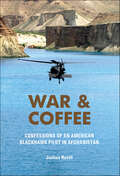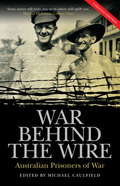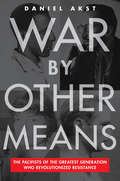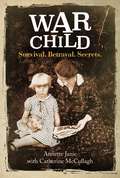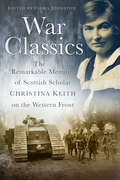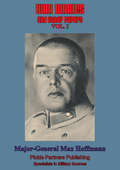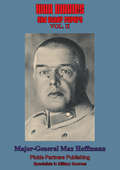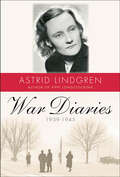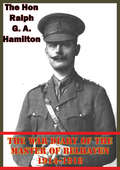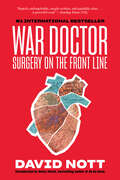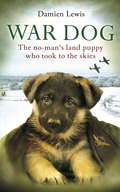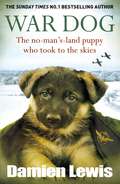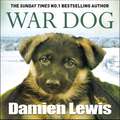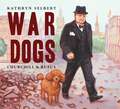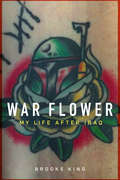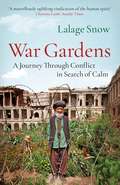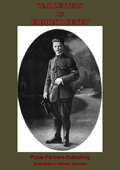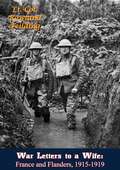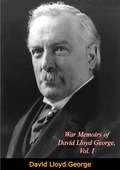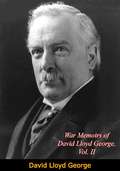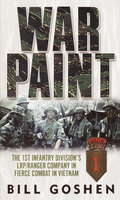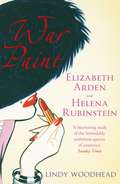- Table View
- List View
War & Coffee: Confessions of an American Blackhawk Pilot in Afghanistan
by Joshua HavillReaders will gain insight into the experience of flying a Blackhawk in combat, including on special-operations missionsBeyond the action of combat, this work eloquently immerses the reader into life within walls of a US military base in Afghanistan Author Joshua Havill recounts his deployment with humility, candor, and humor that will make the story approachable and engaging to readers from any walk of life
War Behind the Wire: Australian Prisoners of War
by Michael CaulfieldMichael Caulfield presents accounts of Australian prisoners of war, capturing the Aussie spirit that manages to endure through all.
War By Other Means: The Pacifists of the Greatest Generation Who Revolutionized Resistance
by Daniel AkstPacifists who fought against the Second World War faced insurmountable odds—but their resistance, philosophy, and strategies fostered a tradition of activism that shaped America right up to the present day. <p><p>In this provocative and deeply researched work of history, Akst takes readers into the wild, heady, and uncertain times of America on the brink of a world war, following four fascinating resisters—four figures who would subsequently become famous political thinkers and activists—and their daring exploits: David Dellinger, Dorothy Day, Dwight MacDonald, and Bayard Rustin. The lives of these diverse anti-war advocates—a principled and passionate seminary student, a Catholic anarchist, a high-brow intellectual leftist, and an African-American pacifist and agitator—create the perfect prism through which to see World War II from a new angle, that of the opposition, as well as to show how great and lasting their achievements were. <p><p>The resisters did not stop the war, of course, but their impact would be felt for decades. Many of them went on to lead the civil-rights and anti-Vietnam War movements, the two most important social stands of the second half of the twentieth century. The various World War II resisters pioneered non-violent protest in America, popularized Gandhian principles, and desegregated the first prison mess halls. Theirs is a story that has never been told.
War Child: Survival. Betrayal. Secrets.
by Catherine McCullagh Annette JanicWar Child is a true story that spans 100 years, revealing agonising choices against the backdrop of Nazi Germany, the lingering effects of war, the 1950s Australian migration experience, and a modern day search .. Magdalena (‘Leni’) is an illegitimate child born in a small town steeped in superstition in pre-World War II Germany. Denounced as a source of shame by her devoutly Catholic grandfather and the narrow-minded townspeople, Leni and her mother eke out a living dogged by poverty and prejudice in a country moving inexorably towards war. With the advance of the Red Army, Leni and her family are stripped of their possessions and forced to survive on their wits, transforming Leni from a meek, cowed girl to breadwinner and protector. She becomes a member of the Hitler youth, while at the same time puzzling over the disappearance of her Jewish friend. Forced to leave school at 14, Leni is confronted with the terrible choice of submitting to secret systematic rape by her employer, or having her mother interned. When she falls pregnant, she is determined to avoid the hardship she endured as a child and marries her Yugoslav boyfriend and migrates to Australia. It is an arduous journey marred by the appalling conditions at Bagnoli transit camp and the enormous difficulties of beginning a new life in Australia. In researching her mother’s life after the death of both parents, Leni’s daughter Annette makes a startling discovery. With her dying breath, Leni’s confidante reveals another secret. A complex search that crosses three continents follows as Annette gradually unravels the web of intrigue that protects her mother’s ultimate secret.
War Classics: The Remarkable Memoir of Scottish Scholar Christina Keith on the Western Front
by Flora JohnstonChristina Keith came from the small town of Thurso on the far north coast of Scotland. Highly intelligent and ambitious, she became a lecturer in Classics at a time when that was still a brave and unusual choice for a woman. Towards the end of the First World War she left behind the sheltered world of academia to live and work among soldiers of all social backgrounds as a lecturer with the Army’s education scheme in France. She writes with warmth and humour of her experiences. When she and a companion travel across the devastated battlefields, just a short time after the guns have fallen silent, her descriptions are both evocative and moving. This unique memoir is an unforgettable read.
War Diaries And Other Papers – Vol. I (War Diaries And Other Papers #1)
by Anon. General Max Hoffmann"Racy two-volume military memoirs of the brilliant mind that conceived the operational plan for Tannenberg, Germany's triumph on the eastern front in 1914. Hoffmann was the strong man in the east for the rest of the war.Max Hoffmann was Chief of Staff to Von Prittwitz, the aristocratic General charged with defending Germany's East Prussian heartland at the outbreak of the Great War. Prittwitz was as inept as his name suggests, and when the Russians steamrollered west far faster than the Germans had expected, he panicked and sought permission to retreat behind the River Vistula. But Hoffman kept his head and conceived a bold scheme to attack and annihilate the Russian advance. This was the operational plan that was already being put into effect when the dynamic duo of Hindenburg and Ludendorff arrived in the east to take over from the disgraced Prittwitz in late August 1914. The result was the total triumph of Tannenberg, soon followed by the twin victory at the Masurian Lakes. Hindenburg and Ludendorff got the credit for Tannenberg rather than its real author, the brilliant Hoffmann, who continued to be a tower of strength on the Eastern front, being part of the German delegation which negotiated the harsh Treaty of Brest-Litvosk which eliminated Russia from the war early in 1918. These two volumes of memoirs comprise (Vol 1) Hoffmann's War Diaries and (Vol II) his reflections which are summed up in his title 'The War of Lost Opportunities'. Hoffmannn believed that the Great War could have been won by Germany in the east in 1914-15, and that Falkenhayn made a major mistake by concentrating on the west. Hoffmann's frank and rather salty comments on Falkenhayn and his other brother officers - including Ludendorff of whom he was a critical admirer - are valuable and revealing, coming as they do from one of the brightest minds among Germany's supreme commanders."-N&M Print Version.
War Diaries And Other Papers – Vol. II (War Diaries And Other Papers #2)
by Anon. General Max Hoffmann"Racy two-volume military memoirs of the brilliant mind that conceived the operational plan for Tannenberg, Germany's triumph on the eastern front in 1914. Hoffmann was the strong man in the east for the rest of the war.Max Hoffmann was Chief of Staff to Von Prittwitz, the aristocratic General charged with defending Germany's East Prussian heartland at the outbreak of the Great War. Prittwitz was as inept as his name suggests, and when the Russians steamrollered west far faster than the Germans had expected, he panicked and sought permission to retreat behind the River Vistula. But Hoffman kept his head and conceived a bold scheme to attack and annihilate the Russian advance. This was the operational plan that was already being put into effect when the dynamic duo of Hindenburg and Ludendorff arrived in the east to take over from the disgraced Prittwitz in late August 1914. The result was the total triumph of Tannenberg, soon followed by the twin victory at the Masurian Lakes. Hindenburg and Ludendorff got the credit for Tannenberg rather than its real author, the brilliant Hoffmann, who continued to be a tower of strength on the Eastern front, being part of the German delegation which negotiated the harsh Treaty of Brest-Litvosk which eliminated Russia from the war early in 1918. These two volumes of memoirs comprise (Vol 1) Hoffmann's War Diaries and (Vol II) his reflections which are summed up in his title 'The War of Lost Opportunities'. Hoffmannn believed that the Great War could have been won by Germany in the east in 1914-15, and that Falkenhayn made a major mistake by concentrating on the west. Hoffmann's frank and rather salty comments on Falkenhayn and his other brother officers - including Ludendorff of whom he was a critical admirer - are valuable and revealing, coming as they do from one of the brightest minds among Germany's supreme commanders."-N&M Print Version.
War Diaries, 1939–1945
by Astrid LindgrenThese personal diaries by the author of Pippi Longstocking chronicle her experiences in Europe during WWII and her astute observations of the conflict.Before she became internationally known for her Pippi Longstocking books, Astrid Lindgren was an aspiring author living in Stockholm with her family at the outbreak of the Second World War. The diaries she kept throughout the hostilities offer her unique perspective—as a civilian, a mother, and an aspiring writer—on the devastating conflict. Lindgren emerges as a morally courageous critic of violence and war, as well as a deeply sensitive and keen observer of world affairs. We hear her thoughts about rationing, blackouts, the Soviet invasion of Finland, and the nature of evil, as well as of her personal heartbreaks, financial struggles, and trials as a mother and writer.Posthumously published in Sweden to great international acclaim, these diaries were called in the Swedish press an “unparalleled war narrative,” “unprecedented.” and a “shocking history lesson.” Illustrated with family photographs, newspaper clippings, and facsimile pages, Lindgren’s diaries provide an intensely personal and vivid account of Europe during the war.
War Diary
by Yevgenia BelorusetsA monumental, deeply penetrating document of life in Kyiv during the first forty-one days of the Russian invasion of Ukraine The young artist and writer Yevgenia Belorusets was in her hometown of Kyiv when Putin’s “special military operation” against Ukraine began on the morning of February 24, 2022. With the shelling of Kyiv, Kharkiv, Odessa, and Kherson, the war with Russia had clearly, irreversibly begun: “I thought, this has been allowed to happen, it is a crime against everything human, against a great common space where we live and hope for a future.” With power and clarity, the War Diary of Yevgenia Belorusets documents the long beginning of the devastation and its effects on the ordinary residents of Ukraine; what it feels like to interact with the strangers who suddenly become your “countrymen”; the struggle to make sense of a good mood on a spring day; the new danger of a routine coffee run. First published in the German newspaper Der Spiegel and then translated and released each day on the site ISOLARII (and on Artforum), the War Diary had an immediate impact worldwide: it was translated by an anonymous collective of writers on Weibo; read live by Margaret Atwood on International Women’s Day; adapted for an episode of This American Life on NPR; and brought to the 2022 Venice Biennale by President Zelensky as part of the pavilion “This is Ukraine: Defending Freedom.”
War Diary Of The Master Of Belhaven 1914-1918
by The Hon Ralph G. A. HamiltonIncludes 29 maps."The author of this diary is an artillery officer who served on the Western Front from 1 Sep. 1915 till his death in action on 31st March 1918, and it is one of the best, ranking alongside Old Soldiers Never Die and The Journal of Private Fraser. Following two brief spells in 1914/1915 with the BEF during the first of which he was injured when his horse fell on him, he arrived in France on 1st Sep. 1915 as OC 'C' Battery, 108 Brigade RFA, 24th Division and before the end of the month he was in the thick of it at Loos. His description of the scene is graphic. He writes about trying to get his guns forward on roads jammed with traffic, trying to find the infantry brigade he was supposed to support, floundering about in the dark under heavy shellfire in an enormous plain of clay having the consistency of vaseline, devoid of any landmark or feature, covered in shell holes...Later he gives a vivid account of the German gas attack at Wulverghem on 30 April 1916, when a mixture of chlorine and phosgene was used causing 338 casualties in the division. During Aug. and Sep. 1916 his division took part in the bitter fighting for Delville Wood and Guillemont, and the diary entries for this period provide some of the most powerfully descriptive writing recorded in any memoirs...He was in action at Messines in June 1917 and a month later at Third Ypres. In Aug. 1917 he was finally given command of a brigade, 108th Brigade RFA still in the 24th Division. When the Germans struck on 21st March 1918 Hamilton was on leave in the UK, but he quickly managed to get back to his brigade, which was in action near Rosieres, a few miles east of Amiens. On 31st March he was killed when a shell burst under his horse just as had happened in Oct. 1914; on that occasion he got away with an injury, this time there was no reprieve..."-Print Ed.
War Doctor: Surgery on the Front Line
by David Nott#1 International Bestseller: A frontline trauma surgeon tells his “riveting” true story of operating in the world’s most dangerous war zones (The Times). For more than twenty-five years, surgeon David Nott has volunteered in some of the world’s most perilous conflict zones. From Sarajevo under siege in 1993 to clandestine hospitals in rebel-held eastern Aleppo, he has carried out lifesaving operations in the most challenging conditions, and with none of the resources of a major metropolitan hospital. He is now widely acknowledged as the most experienced trauma surgeon in the world. War Doctor is his extraordinary story, encompassing his surgeries in nearly every major conflict zone since the end of the Cold War, as well as his struggles to return to a “normal” life and routine after each trip. Culminating in his recent trips to war-torn Syria—and the untold story of his efforts to help secure a humanitarian corridor out of besieged Aleppo to evacuate some 50,000 people—War Doctor is a heart-stopping and moving blend of medical memoir, personal journey, and nonfiction thriller that provides unforgettable, at times raw, insight into the human toll of war.“Superb . . . You are constantly amazed that men such as Nott can witness the extraordinary cruelties of the human race, so many and so foul, yet keep going.” —Sunday Times“Gripping and fascinating medical stories.” —Kirkus Reviews
War Dog: The no-man's-land puppy who took to the skies
by Damien LewisIn the winter of 1939 in the cold snow of no-man's-land, two loners met and began an extraordinary journey together, one that would bind them for the rest of their lives. One was an orphaned puppy, abandoned by his owners as they fled the approaching Nazi forces. The other, a lost soul of a different sort - a Czech airman, flying for the French Air Force but soon to be bound for the RAF and the country that he would call home. Airman Robert Bozdech stumbled across the tiny German Shepherd after being shot down during a daring mission over enemy lines. Unable to desert his charge, he hid the dog inside his flying jacket as he made his escape. In the months that followed the pair would save each other's lives countless times as they fled France and flew together with Bomber Command; the puppy - which Robert named Ant - becoming the Squadron mascot along the way. Wounded repeatedly in action, shot, facing crash-landings and parachute bailouts, Ant was eventually grounded due to injury. Even then he refused to abandon his duty, waiting patiently beside the runway for his master's return from every sortie.By the end of the war Robert and Ant had become very British war heroes, and Ant was justly awarded the Dickin Medal, the 'Animal VC'. Thrilling and deeply moving, their story will touch the heart of anyone who understands the bond that exists between one man and his dog.
War Dog: The no-man's-land puppy who took to the skies
by Damien LewisIn the winter of 1939 in the cold snow of no-man's-land, two loners met and began an extraordinary journey together, one that would bind them for the rest of their lives. One was an orphaned puppy, abandoned by his owners as they fled the approaching Nazi forces. The other, a lost soul of a different sort - a Czech airman, flying for the French Air Force but soon to be bound for the RAF and the country that he would call home. Airman Robert Bozdech stumbled across the tiny German Shepherd after being shot down during a daring mission over enemy lines. Unable to desert his charge, he hid the dog inside his flying jacket as he made his escape. In the months that followed the pair would save each other's lives countless times as they fled France and flew together with Bomber Command; the puppy - which Robert named Ant - becoming the Squadron mascot along the way. Wounded repeatedly in action, shot, facing crash-landings and parachute bailouts, Ant was eventually grounded due to injury. Even then he refused to abandon his duty, waiting patiently beside the runway for his master's return from every sortie.By the end of the war Robert and Ant had become very British war heroes, and Ant was justly awarded the Dickin Medal, the 'Animal VC'. Thrilling and deeply moving, their story will touch the heart of anyone who understands the bond that exists between one man and his dog.
War Dog: The no-man's-land puppy who took to the skies
by Damien Lewis'Damien Lewis is both a meticulous historian and a born storyteller' Lee ChildIn the winter of 1939 in the cold snow of no-man's-land, two loners met and began an extraordinary journey together, one that would bind them for the rest of their lives. One was an orphaned puppy, abandoned by his owners as they fled the approaching Nazi forces. The other, a lost soul of a different sort - a Czech airman, flying for the French Air Force but soon to be bound for the RAF and the country that he would call home.Airman Robert Bozdech stumbled across the tiny German Shepherd after being shot down during a daring mission over enemy lines. Unable to desert his charge, he hid the dog inside his flying jacket as he made his escape. In the months that followed the pair would save each other's lives countless times as they fled France and flew together with Bomber Command; the puppy - which Robert named Ant - becoming the Squadron mascot along the way. Wounded repeatedly in action, shot, facing crash-landings and parachute bailouts, Ant was eventually grounded due to injury. Even then he refused to abandon his duty, waiting patiently beside the runway for his master's return from every sortie.By the end of the war Robert and Ant had become very British war heroes, and Ant was justly awarded the Dickin Medal, the 'Animal VC'. Their story will touch the heart of anyone who understands the bond that exists between one man and his dog.
War Dog: The no-man's-land puppy who took to the skies
by Damien LewisIn the winter of 1939 in the cold snow of no-man's-land, two loners met and began an extraordinary journey together, one that would bind them for the rest of their lives. One was an orphaned puppy, abandoned by his owners as they fled the approaching Nazi forces. The other, a lost soul of a different sort - a Czech airman, flying for the French Air Force but soon to be bound for the RAF and the country that he would call home.Airman Robert Bozdech stumbled across the tiny German Shepherd after being shot down during a daring mission over enemy lines. Unable to desert his charge, he hid the dog inside his flying jacket as he made his escape. In the months that followed the pair would save each other's lives countless times as they fled France and flew together with Bomber Command; the puppy - which Robert named Ant - becoming the Squadron mascot along the way. Wounded repeatedly in action, shot, facing crash-landings and parachute bailouts, Ant was eventually grounded due to injury. Even then he refused to abandon his duty, waiting patiently beside the runway for his master's return from every sortie.By the end of the war Robert and Ant had become very British war heroes, and Ant was justly awarded the Dickin Medal, the 'Animal VC'. Thrilling and deeply moving, their story will touch the heart of anyone who understands the bond that exists between one man and his dog.
War Dogs: Churchill & Rufus
by Kathryn SelbertWinston Churchill, the prime minister of England during World War II, was one of the greatest wartime leaders of the modern era. While he is often likened to the English bulldog due to his tenacious personality and even his physical resemblance to the breed, Mr. Churchill was actually a devoted poodle owner and held quite an affinity for his miniature poodle, Rufus, who withstood the trials of World War II by his owner’s side.Readers follow Rufus and Winston’s friendship through major events in World War II—from the bombings of London and the invasion of Normandy to post-war reconstruction. Secondary text includes quotes from Churchill himself—taken from his rousing speeches to the people of England and to the world. Backmatter includes a timeline of World War II, an author’s note about Churchill’s pets, as well as a short biography, quote sources, and a list of recommended resources for further study.In her debut picture book, Kathryn Selbert has created a unique look at a significant historical figure and period in world history.
War Flower: My Life after Iraq
by Brooke KingBrooke King has been asked over and over what it’s like to be a woman in combat, but she knows her answer is not what the public wants to hear. The answers people seek lie in the graphic details of war—the sex, death, violence, and reality of it all as she experienced it. In her riveting memoir War Flower, King breaks her silence and reveals the truth about her experience as a soldier in Iraq. Find out what happens when the sex turns into secret affairs, the violence is turned up to eleven, and how King’s feelings for a country she knew nothing about as a nineteen-year-old become more disturbing to her as a thirty-year-old mother writing it all down before her memories fade into oblivion. The story of a girl who went to war and returned home a woman, War Flower gathers the enduring remembrances of a soldier coming to grips with post-traumatic stress disorder. As King recalls her time in Iraq, she reflects on what violence does to a woman and how the psychic wounds of combat are unwittingly passed down from mother to children. War Flower is ultimately a profound meditation on what it means to have been a woman in a war zone and an unsettling exposé on war and its lingering aftershocks. For veterans such as King, the toughest lesson of service is that in the mind, some wars never end—even after you come home.
War Gardens: A Journey Through Conflict in Search of Calm
by Lalage Snow'A remarkable book . . . It's a powerful testament to the healing balm of gardening and the resilience of the human spirit in the direst of circumstances.' Financial Times'Not a happy book and yet it's magically heartening. It makes a gardener question his or her values.' The Times'This extraordinary book...warm and engaging...like a photograph magicked to life.' Spectator'Snow has spent ten years as a photographer and filmmaker covering unrest . . . Throughout that time she has sought comfort in green oases and come to understand "how vital gardens are 'against a horrid wilderness' of war". . . There can be few counter-narratives as enchanting and sad as those Snow recounts in War Gardens.' Times Literary Supplement'For all these victims of war, their gardens are places in which to breathe, providing moments of calm, hope and optimism in a fragile life of horror and uncertainty. For many, it helps them to grieve. Books seldom bring a lump to my throat, but this one did.' Spectator'What makes War Gardens the most illuminating garden book to be published this year, is the realisation that people's gardens are the antidotes to the horrors of their surroundings.' Country LifeA journey through the most unlikely of gardens: the oases of peace people create in the midst of warIn this millennium, we have become war weary. From Afghanistan to Iraq, from Ukraine to South Sudan and Syria, from Kashmir to the West Bank, conflict is as contagious and poisonous as Japanese knotweed. Living through it are people just like us with ordinary jobs, ordinary pressures and ordinary lives. Against a new landscape of horror and violence it is up to them to maintain a modicum of normality and colour. For some, gardening is the way to achieve this.Working in the world's most dangerous war zones, freelance war correspondent and photographer Lally Snow has often chanced across a very moving sight, a testimony to the triumph of the human spirit in adversity, a celebration of hope and beauty: a war garden. In Kabul, the royal gardens are tended by a centenarian gardener, though the king is long gone; in Camp Bastion, bored soldiers improvise tiny gardens to give themselves a moment's peace; on both sides of the dividing line in Jerusalem families tend groves of olives and raise beautiful plants from the unforgiving, disputed landscape; in Ukraine, families tend their gardens in the middle of a surreal, frozen war.War Gardens is a surprising, tragic and beautiful journey through the darkest places of the modern world, revealing the ways people make time and space for themselves and for nature even in the middle of destruction. Illustrated with Lally Snow's own award-winning photography, this is a book to treasure.
War Heroes: Ten True Tales
by Allan Zullo"Staff Sergeant Chad Malmberg must find a way to save his convoy ambushed by well-armed insurgents. He faces grim odds, because he and his small band of soldiers are outnumbered ten to one... and they're running out of ammo. Five times throughout a fierce firefight, Marine Scout Sniper Scott Montoya spots an injured comrade in the street. And five times Scott disregards his own safety and rushes out into the open, braving enemy fire to rescue each wounded Marine. These and other American heroes risked their lives serving their country in Iraq. You will never forget their incredible true stories." -Back Cover
War Letters Of Edmond Genet: The First American Aviator Killed Flying The Stars And Stripes
by Grace Ellery Channing Edmond Charles Clinton Genet"Edmond Genet from Ossining, New York, was the first American flier to die in the First World War after the United States declared war against Germany, shot down by anti-aircraft artillery on April 17, 1917. Genet was the great great grandson of Edmond-Charles Genêt, also known as Citizen Genêt, the French Ambassador to the United States shortly before the French Revolution who is mostly remembered for being the cause of an international incident known as the Citizen Genêt Affair.Edmond Genet sailed for France at the end of January, 1915, to join the French Foreign Legion while still technically on leave from the US Navy. He never arranged to be formally relieved of his responsibility to the Navy before joining the Lafayette Escadrille on January 22, 1917. This decision weighed heavily on him as time wore on since he could be classified as a deserter because the US was not yet formally in the war and his involvement in the Escadrille was therefore not an official assignment by the US military...He was particularly celebrated since it was known that he was the descendant of Citizen Genet. As the prospect of American Involvement in the war grew he became both increasingly worried and hopeful that his participation in the Escadrille would not be affected by the American entry into the war and sought the help of prominent Americans in France to help him straighten out his status. Ironically he died shortly after the formal entry of the US into the war before the issue of his status could be dealt with. Although other Americans had died as part of the Escadrille, he was the first one to do so after the US formally declared war on the Central powers. This made him the first official American casualty of the war despite the fact that the US had not yet had time to organize or send any actual troops to Europe...He was 20 years old at the time of his death."--Wiki
War Letters to a Wife: France and Flanders, 1915-1919 [Illustrated Edition]
by Lt.-Col. Rowland FeildingIncludes the First World War Illustrations Pack - 73 battle plans and diagrams and 198 photos.Lieutenant-Colonel Rowland Feilding began his military career as a front line soldier in World War I and a leader of men, preferring to volunteer for a dangerous duty rather than order a subordinate to do so in his place. With a narrative broken only by the months he spent recuperating from wounds, Feilding was blessed with an extraordinary luck: his survival was a mystery even to his comrades. Vivid yet unexaggerated in its depiction of life at the front, Feilding's letters to his wife, Edith Stapleton-Bretherton, are driven by his thoughts, emotions and experiences of the war, and of home. Written with the events still fresh in his mind--and often while still on the battlefield or in the trenches--, these letters form one of the most compelling accounts of the Western Front during the First World War. Compelling reading.-Print ed.
War Memoirs of David Lloyd George, Vol. I (War Memoirs of David Lloyd George #1)
by David Lloyd George“Mr. Lloyd George’s War Memoirs constitute a record of unfading historic interest….No one who wishes to be well informed about the Great War should fail to study them.”—Rt. Hon. Winston S. ChurchillA personal account of World War I events, as told from the perspective of David Lloyd George, former Chancellor of the Exchequer (1908-1915), Minister of Munitions (1915-1916), Secretary of State of War (1916) and, towards war end, Prime Minister of the United Kingdom (1916-1922).
War Memoirs of David Lloyd George, Vol. II (War Memoirs of David Lloyd George #2)
by David Lloyd GeorgeA personal account of World War I events, as told from the perspective of David Lloyd George, former Chancellor of the Exchequer (1908-1915), Minister of Munitions (1915-1916), Secretary of State of War (1916) and, towards war end, Prime Minister of the United Kingdom (1916-1922).“Mr. Lloyd George’s War Memoirs constitute a record of unfading historic interest….No one who wishes to be well informed about the Great War should fail to study them.”—Rt. Hon. Winston S. Churchill
War Paint
by Bill GoshenThe men who served with in the 1st Infantry Division with F company, 52nd Infantry, (LRP) later redesignated as Company I, 75th Infantry (Ranger) --engaged in some of the fiercest, bloodiest fighting during the Vietnam War, suffering a greater relative aggregate of casualties that any other LRRP/LRP/ Ranger company. Their base was Lai Khe, within hailing distance of the Vietcong central headquarters, a mile inside Cambodia, with its vast stockpiles of weapons and thousands of transient VC and NVA soldiers. Recondo-qualified Bill Goshen was there, and has written the first account of these battle-hardened soldiers. As the eyes and ears of the Big Red One, the 1st Infantry, these hunter/killer teams of only six men instered deep inside enemy territory had to survive by their wits, or suffer the deadly consequences. Goshen himself barely escaped with his life in a virtual suicide mission that destroyed half his team. His gripping narrative recaptures the raw courage and sacrifice of American soldiers fighting a savage war of survival: men of all colors, from all walks of life, warriors bonded by triumph and tragedy, by life and death. They served proudly in Vietnam, and their stories need to be told.
War Paint: Elizabeth Arden and Helena Rubinstein: Their Lives, their Times, their Rivalry
by Lindy WoodheadWar Paint is the story of two extraordinary women, Miss Elizabeth Arden and Madame Helena Rubinstein, and the legacy they left: a story of feminine vanity and marketing genius. Behind the gloss and glamour lay obsession with business and rivalry with each other. Despite working for over six decades in the same business, these two geniuses never met face to face - until now. 'The definitive biography of women and their relationships to their faces in the twentieth century' Linda Grant, Guardian'I have seldom enjoyed a book so much . . . the research is staggering . . . a wonderful read' Lulu Guinness
